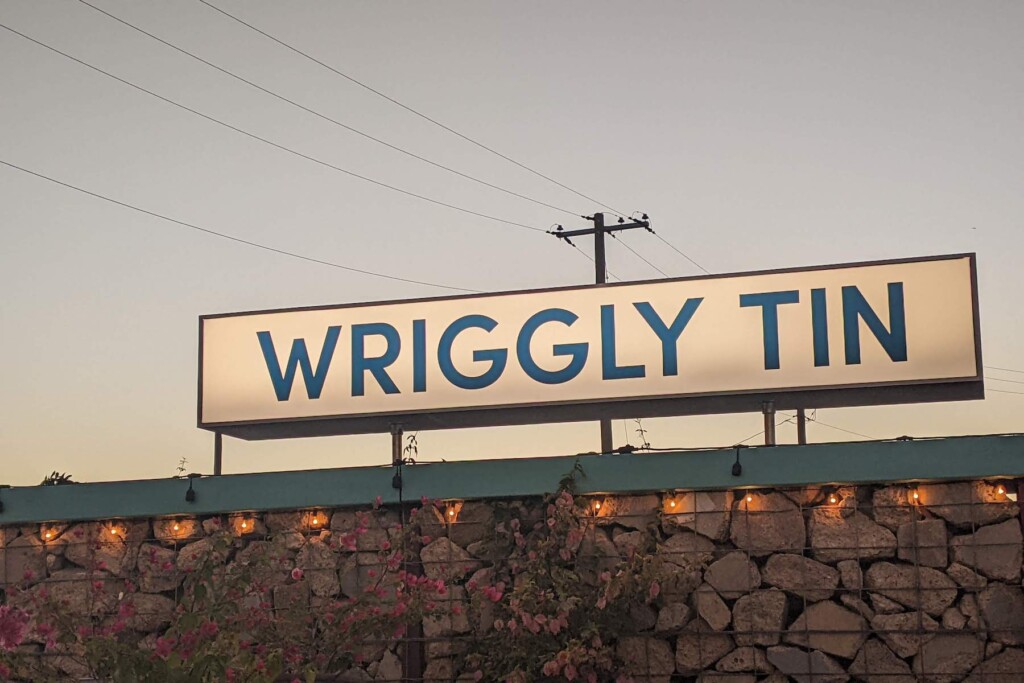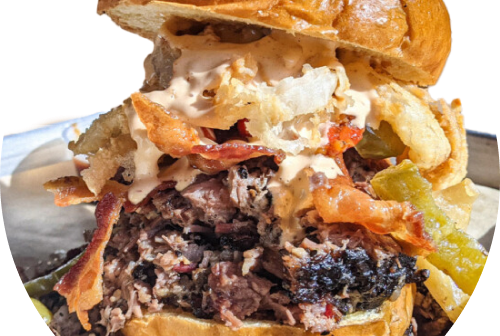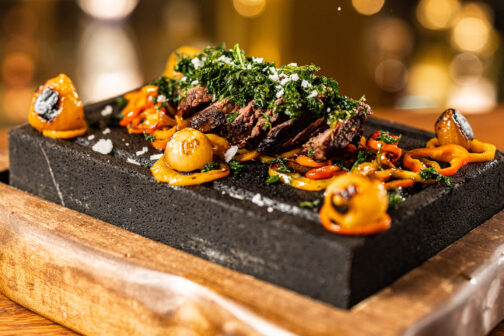Arriving at the new bar Wriggly Tin is like stepping into a teleportation device. One minute, you’re in South Dallas: the neighborhood reduced by decades of prejudiced urban planning to potholed roads, tiny homes, and hulking factories. You’re driving by the recycling plant and into a fenced-off parking lot.
The next moment, you’re in Austin or Marfa. Wriggly Tin sits in a Quonset hut—the bar’s name is a gently funny description of its corrugated roof—and bathes its bar and patio in natural light. One end of the hut has been turned entirely into windows, a memorable glass wall opposite the equally interesting bar. Here, little niches are filled with statues of coyotes and other critters—very West Texas—and aqua makes a bold color against the bar. The corners of walls are rounded off adobe-style. It all looks like a Southwestern minimalist fantasy. I’m probably also making a mental connection to Austin because that city also has a good brewery, Hold Out, located in a Quonset hut. If you go to Hold Out, order the Ol’ Gil.
Even on Wriggly Tin’s patio, its neighborhood feels far away. The aqua umbrellas, field turf, and lazy lean-back chairs encourage you to settle down and stay a while.
What is all this, anyway? Well, it’s a revival of the old Oak Cliff favorite Small Brewpub, but packaged in a very different way. The beer brand is now called Small Beerworks (makes sense), and it’s produced behind the bar, in the hut’s other end. But—in a reflection of craft beer’s declining power in today’s drinking market—owners Aaron Garcia and Jacob Boger decided to tone down the beeriness of the bar. Thus Wriggly Tin is the name, and beer is only a small part of the game.
If this feels like a tightrope walk, the good news is that Wriggly Tin’s goal is to play the hits. Small Beerworks’ beers are friendly, approachable, and well-balanced. They’re also available in mixers if you want to add a splash of grapefruit soda or amaro. Wriggly Tin’s cocktail list has strong resort vacation vibes: a “Pink Cadillac” margarita, a drink called the “Beach Please,” and Mexican rum with Mexican cola. Its food menu leans on classic sandwiches and pizzas.
The goal, clearly, is to be an all-are-welcome neighborhood spot for a neighborhood that is sorely lacking in spots of any kind. Wriggly Tin’s location is one of two things that make it a fascinating place; the other is its view of the service industry’s future.
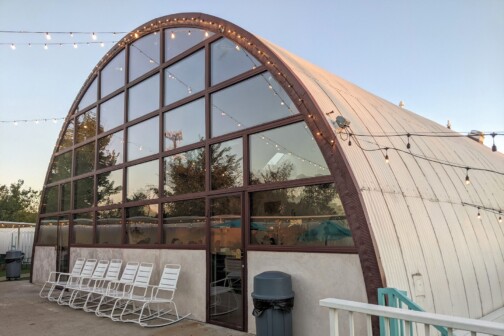
Let’s start with its South Dallas location. The Wriggly Tin team bought the Quonset hut outright and spent most of the pandemic era restoring it. They genuinely want to help lift their neighborhood up.
“This part of Dallas—Fair Park in general—has always been chopped up through the decades for different purposes,” says Garcia, who is head brewer, co-owner, and part of the construction crew, too (he welded the door handles, and his New Mexico heritage can be seen in the bar’s design). “It’s a forgotten area of town, from a city planning standpoint especially. There’s the fairgrounds and there’s everything else, which is just whatever anybody ever wanted to do with it. It’s been chopped up so many ways. There’s a lot of potential.
“I know it’s always tricky building and doing something ‘hip’ and ‘trendy’ in an up-and-coming neighborhood. We have a lot of simple goals. Number one, run a good, honest business. Number two, try to hire locally as best as possible. We probably have half of our staff that lives within two miles right now.”
Garcia says that one of the most profound ways Wriggly Tin can affect its corner of Dallas is by being a good, honest neighbor. He’s already spent years renovating this space and has stories about, for example, a now-closed nearby business that was busted by three different law enforcement agencies.
The bar’s service model is directly informed by its desire to fit in. Cocktails are pre-batched and orders are taken by tabletop QR code—except at a small section of wooden tables directly in front of the bar, in which I accidentally sat during opening weekend. (If you sit at a table with no QR code, you can order at the bar.)
It’s a model that’s sustainable, [and] it enables us to pay them an hourly wage that they will actually stay here and keep working for us.
Aaron Garcia, co-owner of Wriggly Tin
“We will probably get dinged every now and then for the batch cocktails and the limited amount of beers, and we’re gonna get complaints about the QR codes,” Garcia says. (Indeed, the complaints already began in an Eater column. I was confused at first, too.) “But we think it’s a model that’s sustainable, that doesn’t require in-depth training. If somebody’s going to go apply for a job at Walgreens, Family Dollar, they could also apply here. [And] it enables us to pay them an hourly wage that they will actually stay here and keep working for us.”
Regardless of neighborhood, this is a potential preview of the future of American bars. The tipping model is broken, and the service industry has to compete for labor with sectors that pay steady, dependable wages. Wriggly Tin—which is impressively affordable despite including service in the price, by the way; two people can share pizza, drink a beer each, and pay about $30 total—is an experiment in creating a more sustainable business plan.
It’s also an experiment in the craft beer sector, which for many years has been getting increasingly esoteric. “I think the way craft beer approaches its own industry is very much stuck on itself,” Garcia says. “You have the vocal minority defining what craft is supposed to be. But at the end of the day, there are people who just want something easy to drink, whether it be a margarita or a seltzer or whatever. If you look around the world, Miller Lite, High Life—that’s 90% of the beer people drink. That’s the normal palate. The abnormal palate is the craft palate that’s wanting a big IPA.”
Fans of Small Brewpub (like me) will be delighted by the return of Garcia’s super-drinkable beers. Black Pepper Pils, the most famous offering from Small Brewpub, is back and still terrific. It doesn’t taste strongly of pepper or the other aromatics Garcia adds; it just tastes like a classic light beer with a bit of edge. If edge isn’t your thing, the Helles lager, Hart, is even lighter and more relaxed. It’s the kind of beer I want after two minutes outside in a Dallas summer.
Garcia’s menu vows that Underdog will be the only IPA that Wriggly Tin ever makes. That’s kind of a symbol of this bar’s intentions, because Underdog is not an IPA that scorches your mouth with bitterness. The hops are gently dialed up, but the malts are, too, creating a rich but well-balanced, big-flavored but unaggressive beer.
As for Garcia’s own tastes—well, you can’t really identify them based on his menu. “I don’t need to make myself happy with my own beer line,” Garcia says, even though he clearly enjoys his own brews. “I enjoy the process almost more than the end result, which is weird. But it’s just how I am.”
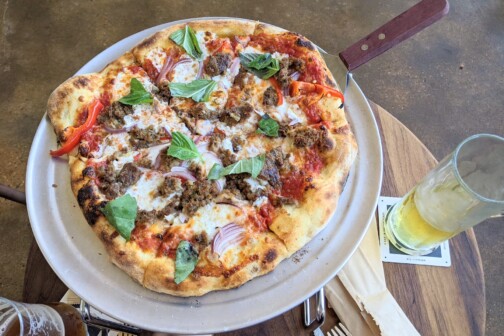
Here, you’re probably expecting me to say that Wriggly Tin’s best feature is one of its drinks. Nope! Desmon Coleman, the chef behind pop-up group Hustle Town, is in the kitchen presiding over terrific pizzas and pretty good appetizers, too. Our Caesar salad was showered with cheese and breadcrumbs. Our meatball pizza was even better. The crust is great—clearly made in house—with good flavor, fluffy air pockets along the edges, and a crisp bake all the way through.
Garcia tells me that he thinks everyone will order pizza on their first visit, and then move on to sandwiches and other items when they return. I’ll try. But I might get stuck on that pizza.
Wriggly Tin’s future plans revolve around more ways it can fit into the neighborhood. Garcia, Boger, and their partners have their eyes on a tiny triangular sliver of land behind the building that’s owned by the city of Dallas and is home to some grass and nothing else. The triangle isn’t usable for anything—the whole plot of land is only about 400 square feet—so Wriggly Tin wants to lobby the city to auction it off, at which point they hope to buy it and build a little stage for live music.
Wriggly Tin’s beers won’t be distributed, or will be minimally distributed. This gives Garcia a chance to brew more lagers—which take weeks longer to make—and it also gives him freedom to try a more sustainable way of selling beer to go. When Wriggly Tin starts selling its beer to go in early 2024, it will package beers in glass bottles that customers can bring back for reuse.
“You’ll be able to buy them here and then bring them back for a discount on food, or whatever,” Garcia says. “We’ll have a rewards program.”
This system is common in Europe, but not yet in the United States. It has several advantages. Beer cans are expensive for a small business, and they’re not the best recyclable item in the world. (To recycle the cans, it’s best to remove the sticker labels.) If enough customers follow the return-your-bottle system, Wriggly Tin can save money and the environment at the same time. Garcia says that the thicker glass bottles used in this system can be washed and reused 20 to 25 times before they deteriorate and must be thrown in the recycle bin for good.
If the brewery’s location makes it feel like a portal out of South Dallas, its practices make it feel like a look at the future. The craft beer business is endangered, as is the service industry in general. Wriggly Tin’s neighborhood is struggling, too. Maybe—maybe—the way to solve those problems is to tackle all of them at once.
Wiggly Tin, 1906 S. Haskell Ave.
Author



